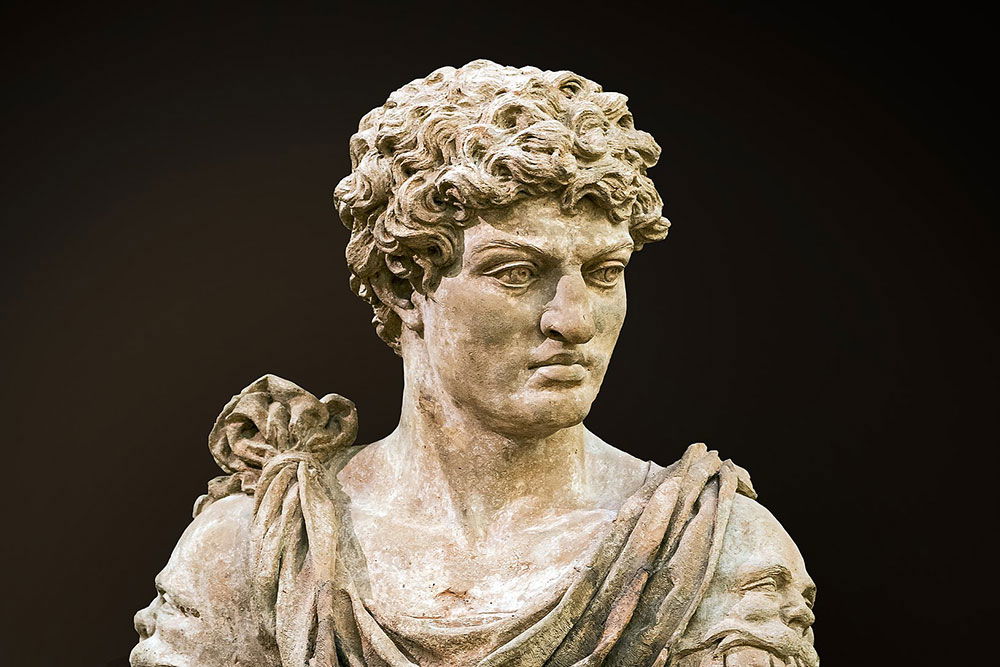
Mark Antony
Mark Antony was born in 83 BCE into a prominent Roman family with a tradition of military and political service. His early years were marked by privilege and chaos as Rome faced growing internal strife.
Antony’s father died when he was young, and he was raised amid the political instability that defined the late Roman Republic. He studied rhetoric and gained early military experience in eastern provinces.
Military beginnings and alliance with Caesar
Antony’s fortunes changed when he joined Julius Caesar’s military campaigns. He fought with distinction in Gaul and developed a reputation as a courageous, if undisciplined, officer.
Caesar recognized his talent and loyalty. Antony became a trusted lieutenant and eventually served as Caesar’s second-in-command during the civil war against Pompey.
Role during Caesar’s dictatorship
When Caesar was appointed dictator, Antony served as co-consul and handled much of the administrative work in Rome. His leadership helped stabilize the capital while Caesar focused on military campaigns.
Antony supported Caesar’s reforms and maintained the loyalty of the army. However, his style was often criticized for extravagance and lack of political subtlety.
The Ides of March and Antony’s response
On March 15, 44 BCE, Caesar was assassinated by a group of senators including Brutus and Cassius. Antony narrowly escaped the attack and quickly took control of the situation.
In the days that followed, he delivered a masterful funeral oration. This speech, full of calculated emotion and rhetoric, swayed public opinion firmly against the conspirators.
The emergence of Octavian
Despite his strong position, Antony’s control was soon challenged by Octavian, Caesar’s adopted heir. Octavian gained the support of the Senate and began building his own power base.
This marked the beginning of a bitter rivalry. At first, the two sides clashed politically, but it soon became clear that military conflict was inevitable.
The formation of the Second Triumvirate
In 43 BCE, Antony, Octavian and Lepidus formed the Second Triumvirate, a legal three-man dictatorship to stabilize Rome. Together they hunted Caesar’s assassins and reasserted control.
They launched a campaign that ended with the defeat of Brutus and Cassius at the Battle of Philippi in 42 BCE. Antony emerged as the most powerful of the three men.
Antony in the East and meeting Cleopatra
After Philippi, Antony took control of the eastern provinces. He moved to Tarsus and summoned Cleopatra, queen of Egypt, to explain her role during the civil war.
The meeting led to a fateful romance. Cleopatra dazzled Antony with her intelligence, charisma and wealth. He was soon deeply involved in her world and her politics.
Love and politics with Cleopatra
Antony’s relationship with Cleopatra became both personal and political. He fathered three children with her and spent long periods in Egypt, increasingly detached from Roman affairs.
He adopted elements of Egyptian royal culture and began to rule in a style many Romans saw as foreign. This raised tensions in Rome, particularly with Octavian.
The growing conflict with Octavian
Octavian used Antony’s relationship with Cleopatra as propaganda. He portrayed Antony as a traitor to Rome, seduced by a foreign queen and plotting against Roman traditions.
The Senate eventually declared war, not on Antony, but on Cleopatra. This allowed Octavian to frame the conflict as a defense of Rome rather than a civil war.
The Battle of Actium
In 31 BCE, the two sides met in the decisive naval Battle of Actium. Antony and Cleopatra’s fleet faced off against Octavian’s forces, commanded by Agrippa.
Cleopatra’s ships eventually withdrew and Antony followed, leaving the rest of the fleet to collapse. It was a crushing defeat that marked the end of their power.
The tragic end of Antony and Cleopatra
Following the defeat at Actium, Antony and Cleopatra retreated to Egypt. As Octavian closed in, they tried to rally support but found themselves isolated and abandoned.
In 30 BCE, Antony, believing Cleopatra was dead, fell on his sword. Mortally wounded, he was brought to her and died in her arms. Cleopatra soon took her own life.
The legacy of Mark Antony
Mark Antony’s life has become the stuff of legend. His political ambition, military leadership and tragic romance with Cleopatra have inspired countless stories and artworks.
His downfall helped pave the way for Octavian, who would become Augustus and the first emperor of Rome. Antony’s death marked the true end of the Roman Republic.
Antony in literature and art
Shakespeare’s "Antony and Cleopatra" immortalized the general as a flawed but passionate hero. His loyalty, pride and love form the core of his dramatic character.
Over the centuries, writers and artists have depicted Antony as both a noble warrior and a man undone by desire. He remains a symbol of how power and emotion can collide.
Was Mark Antony a hero or a failure?
Historians still debate whether Antony’s choices were noble or reckless. His dedication to Caesar and later Cleopatra shows intense loyalty, but also poor political judgment.
He was a man of action rather than strategy, and in the end, his inability to adapt to Roman politics led to his demise. His life reflects the final struggle between republic and empire.
Conclusion: the enduring image of Antony
Mark Antony’s story is a captivating blend of warfare, romance and political drama. He was both a product of his time and a figure who shaped the fate of the Roman world.
Through triumph and tragedy, Antony’s life continues to fascinate. His legacy reminds us that even great power must be balanced by wisdom, or it may lead to ruin.








